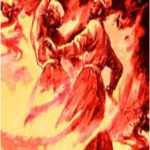Nadab, Abihu, and the “Strange Fire”
Tom Edwards
 The Old Testament abounds with numerous examples that illustrate New Testament principles, such as in Leviticus 10:1-2, in which the lesson is taught that God will not accept just any kind of worship. It reads, “Now Nadab and Abihu, the sons of Aaron, took their respective firepans, and after putting fire in them, placed incense on it and offered strange fire before the Lord, which He had not commanded them. And fire came out from the presence of the Lord and consumed them, and they died before the Lord.” What was this “strange fire” they used? According to the text, it was simply a fire which God did not authorize–apparently, fire from another source.
The Old Testament abounds with numerous examples that illustrate New Testament principles, such as in Leviticus 10:1-2, in which the lesson is taught that God will not accept just any kind of worship. It reads, “Now Nadab and Abihu, the sons of Aaron, took their respective firepans, and after putting fire in them, placed incense on it and offered strange fire before the Lord, which He had not commanded them. And fire came out from the presence of the Lord and consumed them, and they died before the Lord.” What was this “strange fire” they used? According to the text, it was simply a fire which God did not authorize–apparently, fire from another source.
On the Day of Atonement, Aaron was to take a firepan full of coals of fire from upon the altar . . . and put the incense on the fire”’ (Leviticus 16:12-13). And, as Leviticus 6:12-13 shows, the fire was to be kept burning continually upon the altar. For Aaron to have, therefore, used some other source for fire, would have caused him to violate God’s word just as Nadab and Abihu had done.
When the Lord specifies a certain way for something to be performed, He doesn’t have to enumerate on all the ways in which it cannot be. For example, when God told Noah to build an ark using gopher wood, this automatically eliminated the use of any other kind. The Lord did not have to say, “And thou shalt not use hickory, cedar, cypress, walnut, maple,”’ and so on.
This principle of “specific commands” is seen often in the Bible. Take, for instance, the unleavened bread and the fruit of the vine that are to be used in the Lord’s Supper. By specifying these two elements–the former to represent Christ’s body, and the latter to represent His blood–the use of anything else is automatically excluded. Therefore, to use something(s) in addition to, or in place of, would be to profane the communion.
Most people realize this and would find it sacrilegious to add cake and ice cream to the Lord’s Supper or to substitute the fruit of the vine with Coke or Pepsi, but why can’t they also see this regarding the music the church is to use in worshiping God; It is to be a cappella, which is singing without the accompaniment of instrumental music. This is because God has specifically commanded His people to “sing”’ for this New Testament age and has never included authority for using instruments in worship (Colossians 3:16). Though the use of such was commanded during the Mosaical Period, this is irrelevant to how we are to worship God during this Gospel Age in which we now live. Today, it is just the instrument of the heart that is to accompany our singing in praise and worship to God (Ephesians 5:19).
In Leviticus 10:3, the implication is made that Nadab and Abihu did not honor God, nor treat Him as holy, because they chose to change God’s plan and serve the Lord their own way. Do we ever see this happening today? Unfortunately, we do–and not just with instrumental music. Yet we do not have any more right to tamper with God’s word in our time than those who lived during the age of Nadab and Abihu. We must search the Scriptures to learn of God’s authority and respect that authority by humbly submitting to it through obedience.

